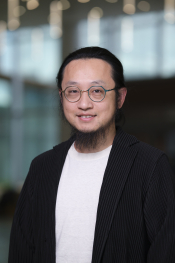Huaishu Peng Receives NSF Award to Advance Semiconductor Learning
As the United States works to expand its semiconductor workforce, educators and researchers are seeking ways to interest students in the field well before they enter college. At the University of Maryland, Assistant Professor Huaishu Peng has received a $1.2 million award from the National Science Foundation to design informal learning experiences that make semiconductors more accessible to middle school students.
The award is supported by two NSF programs: Advancing Informal STEM Learning, which funds projects that test new approaches to science education outside traditional classrooms, and Innovative Technology Experiences for Students and Teachers, which supports efforts that encourage early interest in science, technology, engineering and mathematics. Together, the programs are intended to strengthen pathways into technical fields that are facing a shortage of workers.
Peng’s project will introduce semiconductor concepts through custom learning kits, mixed reality applications and community makerspaces. By combining tangible tools with immersive digital environments, students will be able to explore building blocks such as transistors, logic gates and integrated circuits in ways designed to be approachable. The project will also involve families, educators and local museums to ensure students learn in supportive community settings.
 “This research aims to inspire middle schoolers to see themselves in high-tech careers by removing fears and barriers early on, ultimately strengthening the future semiconductor workforce,” Peng said. “We will also make our curriculum, designs and findings publicly available to support broad adoption nationwide.”
“This research aims to inspire middle schoolers to see themselves in high-tech careers by removing fears and barriers early on, ultimately strengthening the future semiconductor workforce,” Peng said. “We will also make our curriculum, designs and findings publicly available to support broad adoption nationwide.”
The initiative will be carried out in three phases. Initial workshops will bring students, families, educators and experts to shape prototypes of the kits and applications. A second phase will test and refine these tools through pilot sessions. The final phase will deliver the learning experiences in makerspaces across Maryland and Indiana while researchers evaluate how students engage with the material and whether it influences their interest in STEM careers.
Organizers expect the project to directly involve more than 100 students, as well as teachers and parents, over its initial run. By working outside classroom walls, Peng hopes the approach will give students room to experiment, ask questions and view complex technology as something within their reach.
The award comes at a time when national policy has focused heavily on the semiconductor sector. Federal leaders have described it as essential to economic competitiveness and security, and industry representatives have emphasized the importance of building a stronger workforce pipeline. By reaching students early, Peng said, the project aims to add another step to that pipeline.
“I’m honored to receive this award,” Peng said. “With this support, we can inspire young students to explore STEM in new and engaging ways. It’s exciting to see projects that unite computer science, engineering and STEM education, allowing us to bring interdisciplinary knowledge to the next generation.”
Peng directs the Small Artifacts Lab at Maryland, known as the SMART Lab, where his research spans design and fabrication, virtual and augmented reality and assistive technology.
—Story by Samuel Malede Zewdu, CS Communications
The Department welcomes comments, suggestions and corrections. Send email to editor [-at-] cs [dot] umd [dot] edu.
